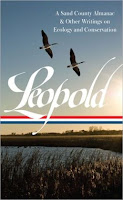 With the annual Great Backyard Bird Count coming-up on Friday, February 15th and with students and teachers at the Liberty Hyde Bailey Interpretive Garden Path doing their part, it is fitting to feature the first published essay by a young L.H. Bailey fittingly entitled, "Birds."
With the annual Great Backyard Bird Count coming-up on Friday, February 15th and with students and teachers at the Liberty Hyde Bailey Interpretive Garden Path doing their part, it is fitting to feature the first published essay by a young L.H. Bailey fittingly entitled, "Birds."
BIRDS: AN ESSAY READ BEFORE THE MICHIGAN STATE POMOLOGICAL SOCIETY AT SOUTH HAVEN, SEPT. 4, 1873, BY MASTER L. H. BAILEY, A LAD OF FIFTEEN YEARS.
Mr. President, Ladies And Gentlemen,—When the rigors of winter are over, and the pleasant days of spring return, what is more charming and delightful than the presence of birds? What is more useful in destroying the myriads of insects which infest our vegetation? Each one, from the different kind of insects it destroys, is almost indispensable to every farmer and fruit grower. As to food, our common birds may be divided into three classes ; first, insectivorous, or insect eaters, which include the blue bird, wren, swallows, nut-hatch, kingbird, and woodpecker.
The bluebird, which is one of the earliest comers and most beneficial of all our singing birds, feeds principally on cut-worms, grasshoppers, and beetles. Like the wren, he will build in most any little box put up for the purpose.
Next in order is that familiar little bird the wren. It subsists mostly on millers and larvae; on account of its small size it destroys a good many insects which other birds do not.
The numerous swallow family feed upon beetles, mosquitoes, and other winged insects.
The nut-hatch, though not so well known as the preceding species, is one of our most useful orchard birds. You may see him creeping about the trees with head downwards, destroying every insect that comes in his way. He suspends his nest underneath a limb, and it is composed of fine twigs and the inside layer of bark.
The kingbird, or tyrant fly-catcher, subsists mostly on beetles, flies, and all sorts of winged insects. Observe him perched upon some old mullen stalk, capturing every insect that comes in sight, and see if he does not fully repay for the few bees he destroys.
The woodpeckers feed upon beetles and larvae. They also destroy the apple tree borer.
Class second is called granivorous, or grain-eating birds, which include the thistle, or yellow bird, cedar bird, chipping sparrow, and ground bird.
The yellow bird, though not insectivorous, may be regarded as our friend. His food consists chiefly of the seeds of thistles and other weeds, thus destroying a great many noxious plants.
The cedar bird, or cherry bird as he is commonly called, feeds almost entirely upon fruit, although in the spring he destroys the canker worm. Nuttall says: "For hours together he may be seen feeding on the all-despoiling canker worm, which infests our apple and elm trees."
The chipping sparrow and
ground bird live on seeds, bugs, and worms on
the ground.
The third class of birds is called omnivorous, or all-eaters, which include the robin, thrush, lark, and cat-bird.
In the spring the robin destroys an immense number of cut worms and injurious insects. Later in the season he takes to fruit.
The thrush, or brown thrasher, feeds mostly on beetles, larvae, and berries. The lark seems to subsist upon grubs, worms and seeds. The food of the cat-bird is mostly larvae, pear slugs, and fruit.
Thus nearly all the noxious insects which infest our fields and forests are devoured. Thousands are destroyed in a day by these harmless songsters, yet the selfish man dooms them to destruction. But this is not all; they have powers of music unequaled by works of art. Their charming songs and beautiful plumage lend life and vivacity to the dullest place:
The robin sings sweetly from her native bowers,
The humming bird sips the dewy flowers,
And the blue-jay's voice is often heard
From the forest, by fragrant breezes stirred.
The thrush, perched upon some lofty tree
That overshades the way.
Pours forth her song with joy and glee,
As if to welcome the coming day.
The lark's sweet warble from the grassy dale
Mingles with the lay of the cat bird and quail,
And the chipping sparrows afford a charm
To the thicket as well as the farm.
The wren chants merrily from the spreading trees
That surround her home of delight,
She smooths her pinions in the passing breeze
And sings from morning until night.
The blue birds warble from the orchards fair,
And the swallows twitter as they fly through the air,
And the yellow-bird's notes from the neighboring hill
Resound to the echoing whip-poor-will.
Among the birds so beautiful and gay
I love to wander all day long;
On pinions of light they fly away
And join the universal revel of song.
 I came across an abbreviated quote by Bailey about excellence. However, you need the full quote for the full meaning. Here it is and keep your dreams alive!
I came across an abbreviated quote by Bailey about excellence. However, you need the full quote for the full meaning. Here it is and keep your dreams alive!
